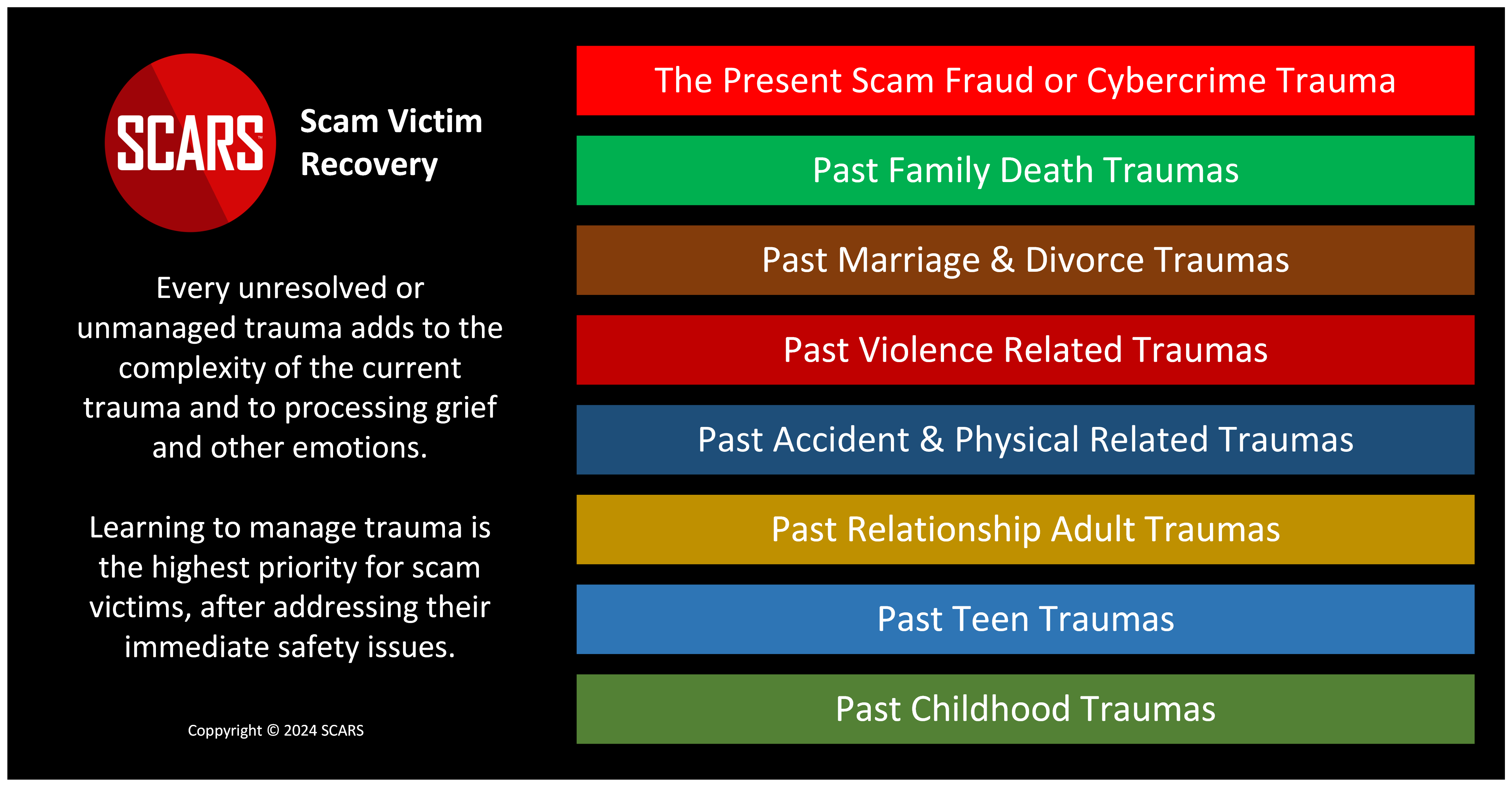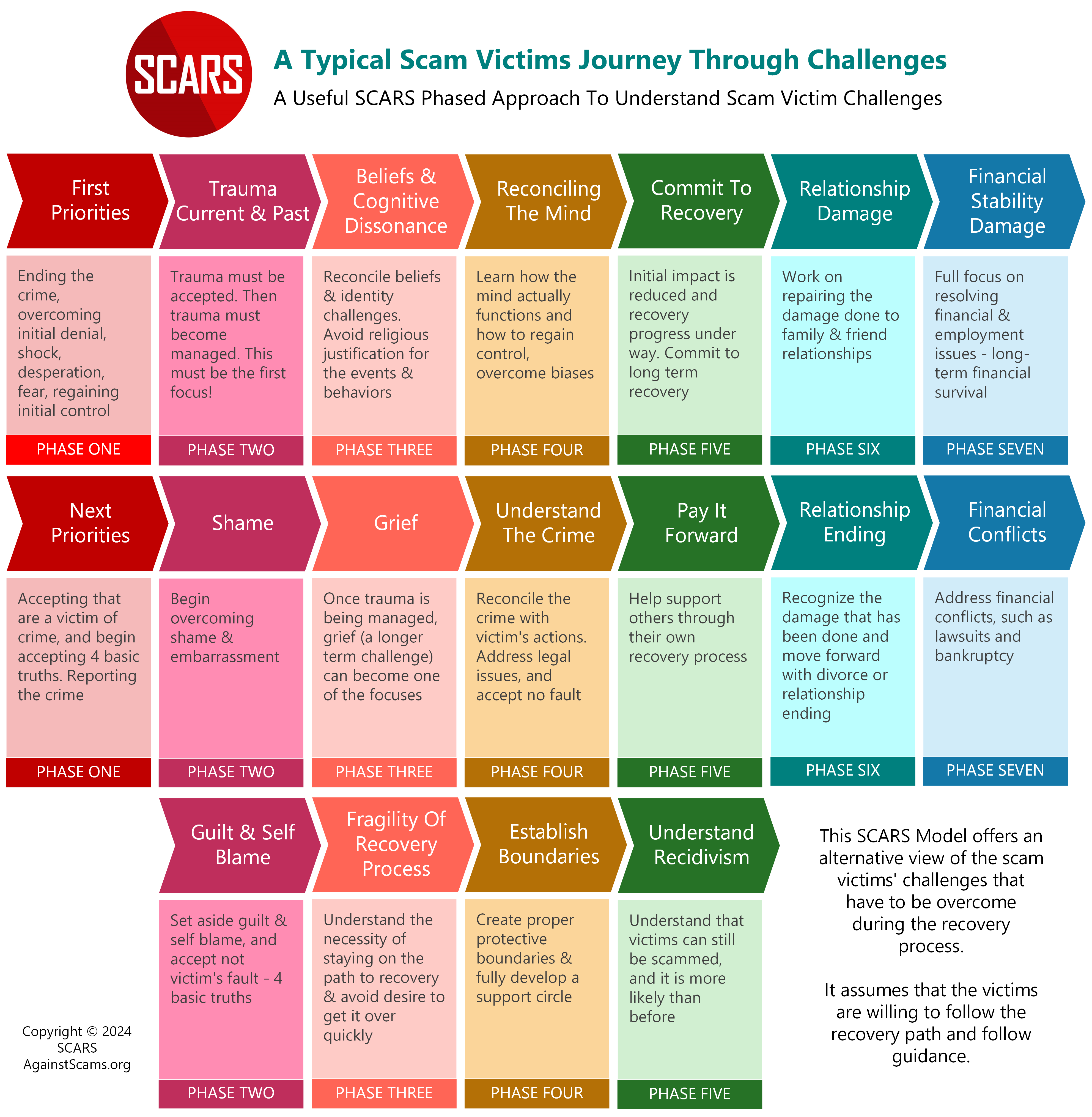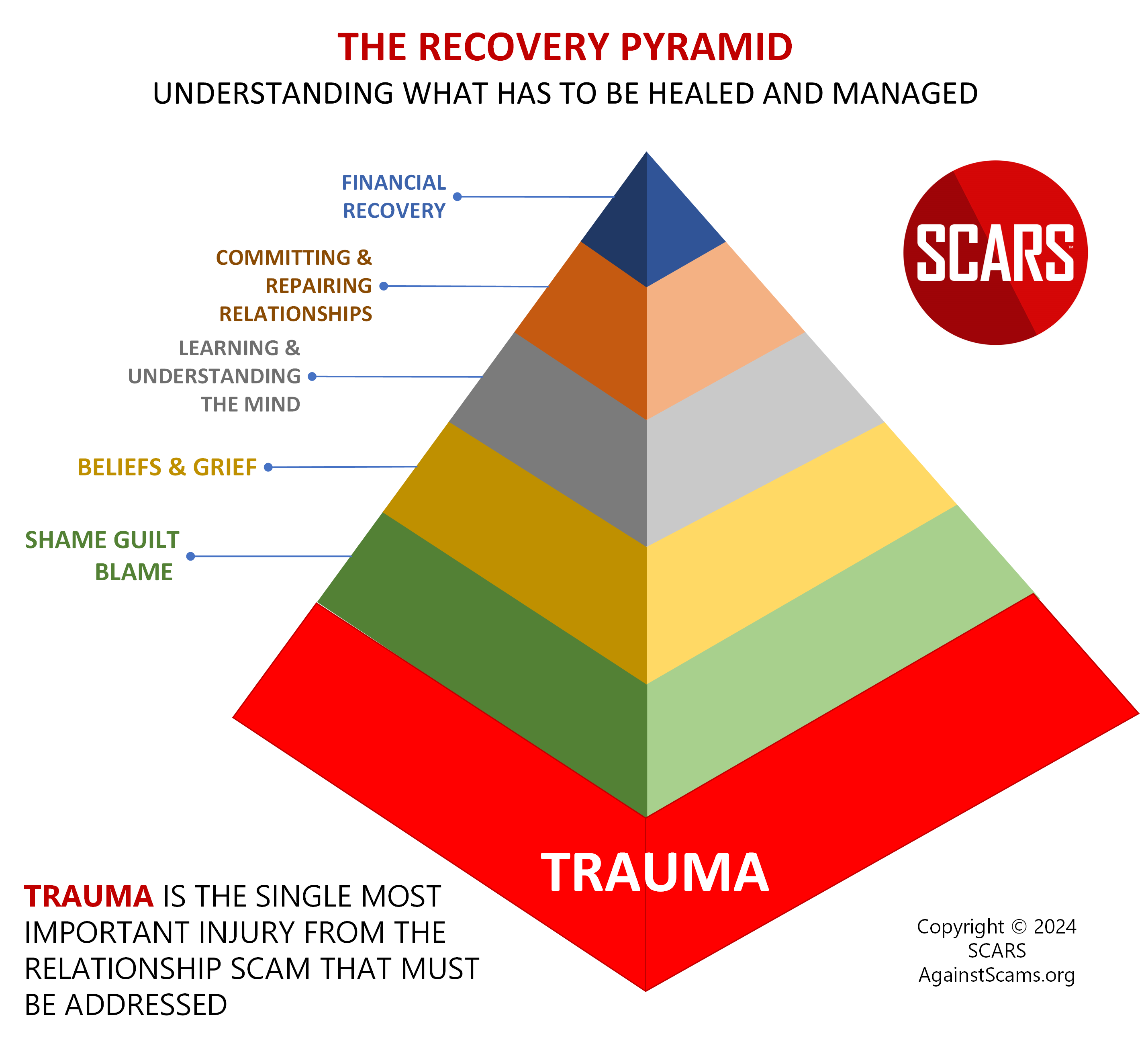A Typical Scam Victim Journey Through Recovery Challenges
Helping Scam Victims Understand What their Priorities Should Be while going through Recovery
A SCARS Scam Victim Recovery Insight – Recovery Psychology
Authors:
• Vianey Gonzalez B.Sc(Psych) – Licensed Psychologist Specialty in Crime Victim Trauma Therapy, Neuropsychologist, Certified Deception Professional, Psychology Advisory Panel & Director of the Society of Citizens Against Relationship Scams Inc.
• Tim McGuinness, Ph.D. – Anthropologist, Scientist, Director of the Society of Citizens Against Relationship Scams Inc.
About This Article
The SCARS phased approach provides a comprehensive framework for understanding and addressing the challenges that afflict scam victims during their recovery process. This is not the only recovery model, but this best reflects the experience that SCARS has had with millions of scam victims over the last decade.
Prioritizing safety, trauma management, grief processing, and self-care are foundational steps in overcoming the aftermath of victimization. Recognizing and addressing feelings of shame, guilt, and grief allow victims to navigate the complex emotions associated with their experiences. Legal and practical matters, rebuilding trust, and fostering well-being further contribute to victims’ healing journey.
Each phase offers guidance tailored to victims’ unique needs, emphasizing the importance of seeking support, maintaining a commitment to recovery, and ultimately reclaiming a sense of empowerment. By following this structured approach, scam victims can navigate the complexities of their experiences and embark on a path towards healing and resilience.

A Useful SCARS Phased Approach To Understand Scam Victim Challenges
Prioritizing the challenges that afflict crime victims after a serious crime can vary depending on individual circumstances and needs.
However, here are some general guidelines on how crime victims might prioritize addressing issues such as trauma, grief, shame, self-blame, and guilt:
- Safety and Immediate Needs: The first priority for crime victims is to ensure their safety and address any immediate physical or emotional needs. This may involve seeking medical attention, securing a safe environment, and reaching out to trusted individuals or support services for assistance.
- Trauma: Addressing trauma is often a crucial step in the healing process for crime victims. Trauma can manifest in various ways, including flashbacks, nightmares, anxiety, and hypervigilance. Seeking support from mental health professionals who specialize in trauma therapy can help victims process their experiences, reduce symptoms, and regain a sense of control over their lives.
- Shame and Self-Blame: Many crime victims experience feelings of shame and self-blame in the aftermath of the crime. It’s important for victims to recognize that they are not responsible for the actions of the perpetrator and that these feelings are common reactions to trauma. Challenging negative self-talk, reframing distorted beliefs, and practicing self-compassion can help victims address shame and self-blame.
- Guilt: Victims may also experience guilt, particularly if they believe they could have prevented the crime or if they feel responsible for the consequences of the crime. It’s important for victims to acknowledge their feelings of guilt without letting them consume their thoughts or dictate their actions. Working with a therapist to explore the underlying causes of guilt and develop coping strategies can be beneficial.
- Grief: Grieving the loss of a loved one or the loss of a sense of safety and security is a natural response to crime victimization. It’s essential for victims to allow themselves to mourn their losses and express their emotions in healthy ways. Connecting with support groups, attending counseling sessions, and participating in rituals or ceremonies can help facilitate the grieving process.
- Legal and Practical Matters: Dealing with legal proceedings, filing reports, and navigating bureaucratic processes can be overwhelming for crime victims. Seeking assistance from victim advocates, legal professionals, or victim support services can help victims understand their rights, access resources, and navigate the legal system with greater ease.
- Rebuilding Trust and Safety: Rebuilding a sense of trust and safety after a crime can take time and effort. Engaging in activities that promote a sense of security, establishing healthy boundaries, and surrounding oneself with supportive and trustworthy individuals can aid in the process of rebuilding trust and reclaiming a sense of safety.
- Self-Care and Well-Being: Prioritizing self-care and well-being is essential for crime victims to regain their strength and resilience. This may involve engaging in activities that promote relaxation, enjoyment, and personal growth, such as exercise, hobbies, meditation, and spending time with loved ones. Taking care of one’s physical, emotional, and mental health is crucial for long-term healing and recovery.
It’s important to recognize that there is no one-size-fits-all approach to addressing the challenges that afflict crime victims. Each individual’s journey toward healing and recovery is unique, and victims need to seek support, guidance, and resources that resonate with their needs and preferences. By prioritizing self-care, seeking professional help, and connecting with supportive networks, crime victims can navigate the complexities of their experiences and ultimately reclaim their sense of empowerment and well-being.
SCARS Recommended Scam Victim Recovery Phases
Phase One
- First Priorities: Ending the crime, overcoming initial denial, shock, desperation, fear, regaining initial control
- Next Priorities: Accepting that are a victim of crime, and begin accepting 4 basic truths. Reporting the crime
Phase Two
- Trauma Current & Past: Trauma must be accepted. Then trauma must become managed. This must be the first focus!
- Shame: Begin overcoming shame & embarrassment
- Guilt & Self Blame: Set aside guilt & self-blame, and accept not the victim’s fault – 4 basic truths
Phase Three
- Beliefs & Cognitive Dissonance: Reconcile beliefs & identity challenges. Avoid religious justification for the events & behaviors
- Grief: Once trauma is being managed, grief (a longer-term challenge) can become one of the focuses
- Fragility Of Recovery Process: Understand the necessity of staying on the path to recovery & avoid the desire to get it over quickly
Phase Four
- Reconciling The Mind: Learn how the mind actually functions and how to regain control, overcome biases
- Understand The Crime: Reconcile the crime with the victim’s actions. Address legal issues, and accept no fault
- Establish Boundaries: Create proper protective boundaries & fully develop a support circle
Phase Five
- Commit To Recovery: Initial impact is reduced and recovery progress is under way. Commit to long-term recovery
- Pay It Forward: Help support others through their own recovery process
- Understand Recidivism: Understand that victims can still be scammed, and it is more likely than before
Phase Six
- Relationship Damage: Work on repairing the damage done to family & friend relationships
- Relationship Ending: Recognize the damage that has been done and move forward with divorce or relationship ending
Phase Seven
- Financial Stability Damage: Full focus on resolving financial & employment issues – long-term financial survival
- Financial Conflicts: Address financial conflicts, such as lawsuits and bankruptcy
This Model
This SCARS Model offers an alternative view of the scam victims’ challenges that have to be overcome during the recovery process.
It assumes that the victims are willing to follow the recovery path and follow guidance.

-/ 30 /-
What do you think about this?
Please share your thoughts in a comment below!
More Recovery Related Information:
- Scam Victims In The RAIN – A Mindfulness Approach For Recovery – 2024 (scamsnow.com)
- Scam Victims Guide To Do-It-Yourself Exposure Therapy – 2024 (scamsnow.com)
- Scam Victims Guide To Do-It-Yourself EFT Tapping – 2024 (scamsnow.com)
- Helping Scam Victims Understand Cognitive Dissonance – 2024 (scamsnow.com)
- Coping with Scam Victim Trauma: Exploring Positive and Negative Coping Mechanisms – 2024 (scamsnow.com)
- Scam Victims Editing Their Stories To Promote Recovery From Scams 2024 (scamsnow.com)
- Scam Victims Will Never Be The Same – A Harsh Truth – 2024 (scamsnow.com)
- PTSD And Complex PTSD – The Difference Between Them – 2023 (scamsnow.com)
- PTSD and Complex Grief/Complicated Grief – What Are The Differences? 2023 (scamsnow.com)
- Understanding Grief & Complex Grief for Scam Victims 2024 (scamsnow.com)
- Scam Victim Stress – The Psychological, Cerebral, and Physiological Effects – 2024 (scamsnow.com)
- Psychological Triggers/Emotional Triggers – What They Are And How They Work – 2023/2024 (scamsnow.com)
-/ 30 /-
What do you think about this?
Please share your thoughts in a comment below!
SCARS LINKS: AgainstScams.org RomanceScamsNOW.com ContraEstafas.org ScammerPhotos.com Anyscam.com ScamsNOW.com
reporting.AgainstScams.org support.AgainstScams.org membership.AgainstScams.org donate.AgainstScams.org shop.AgainstScams.org
youtube.AgainstScams.org linkedin.AgainstScams.org facebook.AgainstScams.org
7 Comments
Leave A Comment
Important Information for New Scam Victims
- Please visit www.ScamVictimsSupport.org – a SCARS Website for New Scam Victims & Sextortion Victims.
- SCARS Institute now offers its free, safe, and private Scam Survivor’s Support Community at www.SCARScommunity.org – this is not on a social media platform, it is our own safe & secure platform created by the SCARS Institute especially for scam victims & survivors.
- SCARS Institute now offers a free recovery learning program at www.SCARSeducation.org.
- Please visit www.ScamPsychology.org – to more fully understand the psychological concepts involved in scams and scam victim recovery.
If you are looking for local trauma counselors, please visit counseling.AgainstScams.org
If you need to speak with someone now, you can dial 988 or find phone numbers for crisis hotlines all around the world here: www.opencounseling.com/suicide-hotlines
Statement About Victim Blaming
Some of our articles discuss various aspects of victims. This is both about better understanding victims (the science of victimology) and their behaviors and psychology. This helps us to educate victims/survivors about why these crimes happened and not to blame themselves, better develop recovery programs, and help victims avoid scams in the future. At times, this may sound like blaming the victim, but it does not blame scam victims; we are simply explaining the hows and whys of the experience victims have.
These articles, about the Psychology of Scams or Victim Psychology – meaning that all humans have psychological or cognitive characteristics in common that can either be exploited or work against us – help us all to understand the unique challenges victims face before, during, and after scams, fraud, or cybercrimes. These sometimes talk about some of the vulnerabilities the scammers exploit. Victims rarely have control of them or are even aware of them, until something like a scam happens, and then they can learn how their mind works and how to overcome these mechanisms.
Articles like these help victims and others understand these processes and how to help prevent them from being exploited again or to help them recover more easily by understanding their post-scam behaviors. Learn more about the Psychology of Scams at www.ScamPsychology.org
SCARS INSTITUTE RESOURCES:
If You Have Been Victimized By A Scam Or Cybercrime
♦ If you are a victim of scams, go to www.ScamVictimsSupport.org for real knowledge and help
♦ SCARS Institute now offers its free, safe, and private Scam Survivor’s Support Community at www.SCARScommunity.org/register – this is not on a social media platform, it is our own safe & secure platform created by the SCARS Institute especially for scam victims & survivors.
♦ Enroll in SCARS Scam Survivor’s School now at www.SCARSeducation.org
♦ To report criminals, visit https://reporting.AgainstScams.org – we will NEVER give your data to money recovery companies like some do!
♦ Follow us and find our podcasts, webinars, and helpful videos on YouTube: https://www.youtube.com/@RomancescamsNowcom
♦ Learn about the Psychology of Scams at www.ScamPsychology.org
♦ Dig deeper into the reality of scams, fraud, and cybercrime at www.ScamsNOW.com and www.RomanceScamsNOW.com
♦ Scam Survivor’s Stories: www.ScamSurvivorStories.org
♦ For Scam Victim Advocates visit www.ScamVictimsAdvocates.org
♦ See more scammer photos on www.ScammerPhotos.com
You can also find the SCARS Institute’s knowledge and information on Facebook, Instagram, X, LinkedIn, and TruthSocial
Psychology Disclaimer:
All articles about psychology and the human brain on this website are for information & education only
The information provided in this and other SCARS articles are intended for educational and self-help purposes only and should not be construed as a substitute for professional therapy or counseling.
Note about Mindfulness: Mindfulness practices have the potential to create psychological distress for some individuals. Please consult a mental health professional or experienced meditation instructor for guidance should you encounter difficulties.
While any self-help techniques outlined herein may be beneficial for scam victims seeking to recover from their experience and move towards recovery, it is important to consult with a qualified mental health professional before initiating any course of action. Each individual’s experience and needs are unique, and what works for one person may not be suitable for another.
Additionally, any approach may not be appropriate for individuals with certain pre-existing mental health conditions or trauma histories. It is advisable to seek guidance from a licensed therapist or counselor who can provide personalized support, guidance, and treatment tailored to your specific needs.
If you are experiencing significant distress or emotional difficulties related to a scam or other traumatic event, please consult your doctor or mental health provider for appropriate care and support.
Also read our SCARS Institute Statement about Professional Care for Scam Victims – click here
If you are in crisis, feeling desperate, or in despair, please call 988 or your local crisis hotline – international numbers here.
More ScamsNOW.com Articles
A Question of Trust
At the SCARS Institute, we invite you to do your own research on the topics we speak about and publish. Our team investigates the subject being discussed, especially when it comes to understanding the scam victims-survivors’ experience. You can do Google searches, but in many cases, you will have to wade through scientific papers and studies. However, remember that biases and perspectives matter and influence the outcome. Regardless, we encourage you to explore these topics as thoroughly as you can for your own awareness.

















![NavyLogo@4x-81[1] A Typical Scam Victim Journey Through Recovery Challenges - 2024](https://scamsnow.com/wp-content/uploads/2025/04/NavyLogo@4x-811.png)










![scars-institute[1] A Typical Scam Victim Journey Through Recovery Challenges - 2024](https://scamsnow.com/wp-content/uploads/2025/04/scars-institute1.png)

![niprc1.png1_-150×1501-1[1] A Typical Scam Victim Journey Through Recovery Challenges - 2024](https://scamsnow.com/wp-content/uploads/2025/04/niprc1.png1_-150x1501-11.webp)
Thank you for this.
The pyramid is a great visual and helps me understand the various steps necessary in this journey. That trauma is the biggest injury and the financial hit is the smallest, gives me hope that I’ll be okay financially one day.
The victim recovery model is a reminder that all trauma experienced throughout life is stacked on top of the previous trauma. It’s a lifelong journey to uncover each layer.
Thank you for this article – very concise presentation that is easy to understand and follow. I am glad that I have a relationship with a trauma therapist and am working with her at this time. My fraud has come out of a big blob of stuff that started during the pandemic that is mixed with childhood and adult marriage trauma (some still unresolved), I am handling the grief caused by retirement from a job I loved, I am handling grief at the loss of my mother during the pandemic, I am handling a move of household over 225 miles away from family and close friends, I am the primary caregiver for my 93 year old father who lives with us and discovering our state has little help for caregivers. I have discovered that all of this has rolled into the old traumas of an abusive first marriage. I have discovered I am not invincible. I have discovered a lot of this may had increased my susceptibility to the fraud. I am handling so much that I viewed myself as not valuable.
I enjoy reading the articles, they are full of great information.
I really like the pyramid:
1. Trauma
2. Shame, Guilt, Blame
3. Blielfs, Grief
4. Learning and Understanding the Mind⁹
5. Committing and Repairing Relationships
6. Financial Recoveryl9
Recovery for me is tricky sometimes. I take two steps forward, and then out of nowhere a challenge shows up and I take one step back. I get tired, but I learn to rest and not quit. Being patient with myself is giving myself the respect I deserve to continue forward.
Recovery will be ongoing, as the scam will always be a part of my past. I’m working on making sure it doesn’t ruin my future.
What are the four basic truths mentioned in phase 1?
Excellent scheduled order to recover from the trauma.